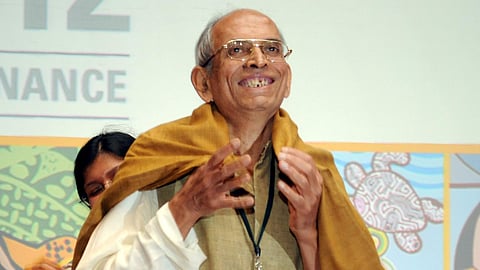

THIRUVANANTHAPURAM: Forest Minister A K Saseendran, who caught the tiger by the tail by suggesting culling of the big cats in Wayanad as a remedy for human-animal conflicts, found an unexpected ally on Wednesday in noted environmentalist Madhav Gadgil.
Gadgil, the chairman of the Western Ghats Ecology Expert Panel, favoured the idea and suggested there should be licensed hunting outside India’s national parks. “India is the lone country having a legislation for protecting wild animals. I think it is irrational, foolish, unconstitutional and nothing to be proud of. No other country protects wild animals outside of its national parks,” Gadgil told TNIE. As for licensed hunting, he said it did not reduce the wild animal population.
“The body of animals should be given to local people as compensation for their sufferings. In the US, Africa and Britain, people shoot wild animals. Rational hunting is implemented even in Scandinavian countries. The Ministry of Environment and Forest should hold talks with the local community on how many wild animals should be culled. The licence should be given properly,” he said.
Gadgil for scrapping of ’72 Wildlife Act, bringing in new legislation
Gadgil asked: “When a human is found to be a threat, necessary action is taken as per relevant sections of the IPC. Then why not kill a wild animal if it poses a threat to your life?” Gadgil also demanded scrapping of the Wildlife Protection Act (WPA), 1972, and bringing in a new legislation.
“A decentralised management plan should be implemented down to the ground level. India should implement the Biodiversity Act, 2002 which gives empowers local people to protect local biodiversity,” he said. He also said environmentalists who were against culling were anti-people conservationists. Meanwhile, forest officials said since tigers are included in the Schedule 1 of the WPA, the government should consider their rehabilitation to other sanctuaries and national parks where they are fewer in number.
“Kerala can approach the Rajasthan government since the Sariska National Park can accommodate a few tigers. Other states may also be interested,” a chief conservator of forest told TNIE. However, many environmentalists opposed the idea of culling and blamed the major characteristic changes that occurred in the forests in Wayand over the years for the disaster.
“The Wayanad wildlife sanctuary, north and south division, has very little forest cover,” said an environmentalist. “In Muthumalai, Bandipur, Nagarhola and Brahmagiri forests and parks, the forest has become drier. Water scarcity has also become acute. So, tigers usually come to Wayanad forests as it is the only place that has water and is suitable for their survival,” he said, adding that rehabilitating a tiger is not an option as it will lead to confrontation between the big cats over territory, prey and mating.
Wayanad Prakriti Samrakshana Samithi president N Badusha said the big cats were not posing a threat in Wayanad as was being propagated. He blamed organisations like the Kerala Independent Farmers Association (KIFA) for propagating falsehoods. “Since 2012, six people died in tiger attacks in Wayanad. Barring two incidents, all happened inside the forest. Over 25,000 cattle graze inside the forest, but no untoward incident has been reported,” said Badusha.